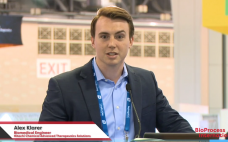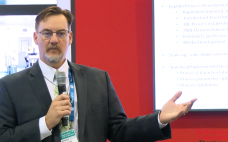Representing Hitachi Chemical Advanced Therapeutic Solutions, Alex Klarer spoke to the BPI Theater at BIO on Tuesday, 4 June 2019, about ways to improve patient access to revolutionary T-cell immunotherapies. A feasible solution, Klarer contended, is to develop a form of stirred-batch bioculture that reduces the entire manufacturing process while still maintaining high expansion rates with low media use. To establish this as a possibility, Klarer described his firm’s experiments with small and large batches on a Distek cell culture…
Thursday, July 18, 2019 Daily Archives
Process Development of a Closed CAR-T Manufacturing Process
Representing GE Healthcare, Rohin Iyer joined BPI Theater at BIO on Tuesday, 4 June 2019, to explore how academic and clinical drug sponsors could partner with service providers to develop bioprocesses more akin to those in the industry at large. Iyer chronicled GE’s collaboration with the non-profit Center for Commercialization of Regenerative Medicine (CCRM), a public–private partnership in which a team of 105 people (both GE Healthcare and CCRM employees) work together at one location. Elaborating this example, Iyer pointed…
Reliable Supply Network with the Highest Quality Performance, the Most Stringent Change Management and Built-In Business Continuity for Single-Use Supplies
This webcast features: Claudio Catallo, Head of Global Supply Chain and Optimization Network Strategy Execution for Fluid Management Technology Operations Unit at Sartorius Stedim Biotech, and Elisabeth Vachette, Head of Product Management for Bags/Mixing/Tanks within the Single Use Fluid Management Technologies Department at Sartorius Stedim Biotech Single-use system implementation is increasing at a steady rate, recognizing the huge benefit of disposable material in biotechnology processes, providing safer, greener, cheaper and more flexible drug manufacturing processes. Our unique expertise in global…
Blockbuster 2.0: Who’s Ready?
During a BPI Theater at BIO presentation on Wednesday, 5 June 2019, Charles Christy, director of commercial development at Ibex Solutions (Lonza Pharma and Biotech), considered the increasing speed of molecule discovery, process development, and clinical approval in the biopharmaceuticals industry. Weighing the promises and pitfalls of such a volatile, uncertain market, Christy offered drug developers advice about when to build biomanufacturing facilities in-house and when to outsource services. One solution, Christy suggests, is to partner with agile contract development…
Quality Considerations for Introducing New Products into Your Facility
Ray Marzouk, vice president of quality at Avid Bioservices, joined the BPI Theater at BIO on Wednesday, 5 June 2019, to call out factors that drug developers often neglect when they are deciding whether to enlist a contract development manufacturing organization (CDMO) for scaling up and introducing new therapies in a competitive market. Citing examples related to ICH Q5d cell banking rules, Marzouk explained how Avid conducts smooth and rapid transfers of key process elements and quality diagnostics. Streamlining that…
Next-Generation Manufacturing for Biopharmaceuticals
In this BPI Theater @ BIO presentation from Tuesday, 4 June 2019, Thomas Page, a vice president of engineering and asset development, explains how Fujifilm Diosynth partners with other organizations to deliver commercial-quality chemistry, manufacturing, and controls (CMC) for complex, next-generation biopharmaceuticals. Rather than simply transacting with clients, Page notes, his firm elects to go beyond standard engineering controls for patient safety and clinical filing. Using a wider array of risk assessments than is typical in the industry enables Fujifilm…
AveXis: ‘Speedy scale-up driven by Novartis acquisition’
With its own facilities, support from Novartis and now dedicated space at Catalent’s Paragon, AveXis says it has the most gene therapy manufacturing capacity in the industry. AveXis has inked a deal with contract development and manufacturing organization (CDMO) Paragon Gene Therapy to secure dedicated manufacturing space for its one-off spinal muscular atrophy (SMA) treatment Zolgensma (onasemnogene abeparvovec), approved in the US in May. Paragon’s facility in Maryland will also provide process development for clinical supply of other gene therapy…







